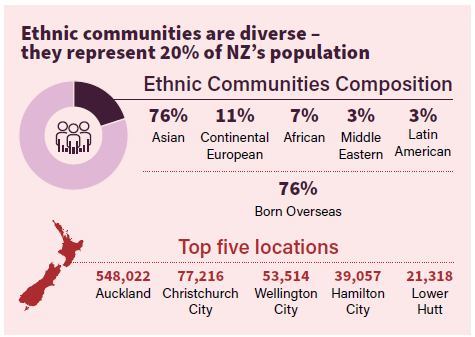On this page
Our functions
The Ministry for Ethnic Communities has three business units in addition to the Chief Executive’s Office – System Capability and Programmes, Policy and Analytics, and Strategic Engagement and Partnerships. Some have been expanded so that the appropriate capability and expertise are available to deliver on the Ministry’s work programme.
This year, the Ministry continued providing policy advice to support the Minister for Diversity, Inclusion and Ethnic Communities. A significant aspect of this work was collaborating with other agencies to identify how policy options would impact ethnic communities.
The Ministry also provided advice on Ministerial and parliamentary matters, such as Official Information Act requests and written and oral Parliamentary Questions.
The Ministry continued to lead the identification, design and implementation of tools, such as the intercultural eLearning module and the translation guide, to build the intercultural capability and capacity of the public sector.
As a new addition to its functions, the Ministry successfully established the Analytics, Monitoring and Evaluation function. This aimed to bolster the Ministry’s data and insights capabilities to provide evidence-informed policy advice and monitor outcomes for ethnic communities.
"I am pleased that the work your Ministry has been doing for our community and the wider society has been incredibly valuable at many levels. Whilst it is still ‘baby steps’ for a new Ministry, what has impressed me is the maturity of planning, the in-depth approach to engagement and the ability to make your services aligned to the needs of our community. Of course, the Comms has been an outstanding feature."
Abdur Razzaq, Chairperson, Federation of Islamic Associations of New Zealand (FIANZ) Royal Commission Submission and Follow-up
The communities we serve
Aotearoa New Zealand is one of the world’s most ethnically diverse countries, with almost 20 percent (approximately one million) of the population identifying as ethnic, 17 percent as Māori, and 8 percent as Pacific according to Census 2018.
By 2033, it is estimated these populations will grow to 25 percent for ethnic communities, 19 percent for Māori and 10 percent for Pacific, respectively, when compared to the total population.
The Ministry’s remit includes people who identify as African, Asian, Continental European, Latin American or Middle Eastern. They include former refugees, asylum seekers, new and temporary migrants, long-term settlers and multigenerational New Zealanders.
 Ethnic communities tend to earn less than the general population, even though they are more highly qualified. Several factors contribute to this, including workforce age, recent migration status, how well qualifications match job roles and the industries they work in.
Ethnic communities tend to earn less than the general population, even though they are more highly qualified. Several factors contribute to this, including workforce age, recent migration status, how well qualifications match job roles and the industries they work in.
As our ethnic communities are incredibly diverse, they speak more than 160 languages. The most spoken languages among these communities are English, Northern Chinese (Mandarin), Hindi, Yue (Cantonese), Sinitic (other Chinese dialects), Tagalog, Punjabi, Korean, Fijian, Hindi and Afrikaans. Most are born overseas (76 percent).
The number of faiths ranges from 38 in the Middle Eastern community to 45 in the Asian community.
